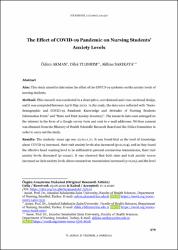| dc.contributor.author | Akman, Özlem | |
| dc.contributor.author | Yıldırım, Dilek | |
| dc.contributor.author | Sarıkaya, Aklime | |
| dc.date.accessioned | 2020-12-31T22:33:03Z | |
| dc.date.available | 2020-12-31T22:33:03Z | |
| dc.date.issued | 2020 | en_US |
| dc.identifier.issn | 2536-4499 | |
| dc.identifier.issn | 2602-2605 | |
| dc.identifier.uri | https://hdl.handle.net/11363/2544 | |
| dc.description.abstract | Aim: This study aimed to determine the effect of the COVID-19 epidemic on the anxiety levels of nursing students.
Method: This research was conducted in a descriptive, correlational and cross-sectional design, and it was completed between April-May 2020. In the study, the data were collected with “Socio-demographic and COVID-19 Pandemic Knowledge and Attitudes of Nursing Students Information Form” and “State and Trait Anxiety Inventory”. The research data were arranged on the internet in the form of a Google survey form and sent to e-mail addresses. Written consent was obtained from the Ministry of Health Scientific Research Board and the Ethics Committee in order to carry out the study.
Results: The students’ mean age was 22.61±1.70. It was found that as the level of knowledge about COVID-19 increased, their trait anxiety levels also increased (p=0,004), and as they found the effective hand washing level to be sufficient to prevent coronavirus transmission, their trait anxiety levels decreased (p=0,040). It was observed that both state and trait anxiety scores increased as their anxiety levels about coronavirus transmission increased (p<0,05), and the level of state anxiety rose as the worries about the transmission to family members increased (p=0,005).
Conclusion: It was determined that the COVID-19 pandemic increased the anxiety level of nursing students. The study concluded that it would be a good method to provide training to help nursing students, who will become health professionals, in developing their attitudes and knowledge of COVID-19-related anxiety and coping methods used to deal with anxiety. Therefore, it was considered that COVID-19-related training should be provided in courses or scientific activities such as independent seminars and conferences; students should be encouraged to talk about their feelings and thoughts, consultancy services should be provided and this issue should be further investigated using case studies. | en_US |
| dc.description.abstract | Amaç: Bu çalışmada COVID-19 pandemisinin hemşirelik öğrencilerinin kaygı düzeyleri üzerine etkisini incelemek amaçlanmıştır.
Yöntem: Araştırma, tanımlayıcı, korelasyonel ve kesitsel araştırma tasarımda yürütülmüş ve Nisan-Mayıs 2020 tarihleri arasında tamamlanmıştır. Araştırmada veriler “Sosyodemografik ve COVID-19 Pandemi Bilgi ve Tutum Formu” ve “Durumluk ve Sürekli Kaygı Envanteri” ile toplandı. Araştırma verileri internet ortamında Google anket formu şeklinde düzenlenerek mail adreslerine gönderildi. Öğrenciler anket formunu doldurduktan sonra araştırmacıların mail adreslerine tekrar geri gönderdi. Çalışmanın yürütülebilmesi için Sağlık Bakanlığı Bilimsel Araştırmalar Kurulu’ndan ve Etik Kurul’dan izin alındı.
Bulgular: Öğrencilerin yaş ortalaması 22,61±1,70 yıl idi. Koronavirüs hakkındaki bilgi düzeyleri arttıkça, sürekli kaygı düzeylerinin de arttığı (p=0,004), koronavirüs bulaşmasını önlemek için etkili el yıkama düzeyini yeterli buldukça sürekli kaygı düzeylerinin azaldığı saptandı (p=0,040). Koronavirüsün bulaşması hakkındaki endişe düzeyleri arttıkça, hem durumluluk hem de sürekli kaygı puanlarının arttığı (p<0,05), aile bireylerine bulaşması hakkındaki endişeleri arttıkça, durumluluk kaygı düzeylerinin arttığı görüldü (p=0,005).
Sonuç: COVID-19 pandemisinin hemşirelik öğrencilerinin kaygısını artırdığı belirlendi. Sağlık profesyoneli olacak hemşirelik öğrencilerine, COVID-19 ilişkili kaygılarına yönelik bilgi, tutumlarını ve başa çıkmada kullandıkları baş etme yöntemlerini geliştirmeye yardımcı olmak için eğitim verilmesinin iyi bir yöntem olacağı düşünülmektedir. Bu nedenle, derslerde veya bağımsız seminer, konferans gibi bilimsel etkinliklerde COVID-19 ilişkili eğitimlerin sunulması, öğrencilerin duyguları ve düşünceleri hakkında konuşmaya cesaretlendirilmesi, danışmanlık hizmetlerinin verilmesi ve konunun olgu tartışmaları ile somutlaştırılması gerektiği düşünülmektedir. | en_US |
| dc.language.iso | eng | en_US |
| dc.publisher | İstanbul Gelişim Üniversitesi Yayınları / Istanbul Gelisim University Press | en_US |
| dc.relation.isversionof | https://doi.org/10.38079/igusabder.757110 | en_US |
| dc.rights | info:eu-repo/semantics/openAccess | en_US |
| dc.rights | Attribution-NonCommercial-NoDerivs 3.0 United States | * |
| dc.rights.uri | http://creativecommons.org/licenses/by-nc-nd/3.0/us/ | * |
| dc.subject | COVID-19 | en_US |
| dc.subject | anxiety | en_US |
| dc.subject | nursing students | en_US |
| dc.subject | pandemic | en_US |
| dc.subject | hemşirelik öğrencileri | en_US |
| dc.subject | kaygı | en_US |
| dc.subject | pandemi | en_US |
| dc.title | The Effect of COVID-19 Pandemic on Nursing Students’ Anxiety Levels | en_US |
| dc.title.alternative | COVID-19 Pandemisinin Hemşirelik Öğrencilerinin Kaygı Düzeylerine Etkisi | en_US |
| dc.type | article | en_US |
| dc.relation.ispartof | İstanbul Gelişim Üniversitesi Sağlık Bilimleri Dergisi | en_US |
| dc.department | İstanbul Gelişim Üniversitesi | en_US |
| dc.authorid | https://orcid.org/0000-0003-1460-3251 | en_US |
| dc.authorid | https://orcid.org/0000-0002-6228-0007 | en_US |
| dc.authorid | https://orcid.org/0000-0002-7576-801X | en_US |
| dc.identifier.issue | 12 | en_US |
| dc.identifier.startpage | 379 | en_US |
| dc.identifier.endpage | 397 | en_US |
| dc.relation.publicationcategory | Makale - Ulusal Hakemli Dergi - Başka Kurum Yazarı | en_US |



















